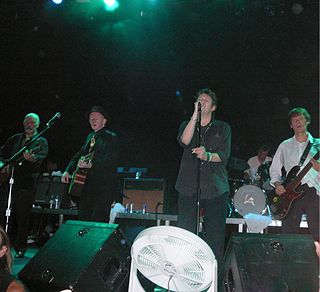
The Pogues were an English or Anglo-Irish Celtic punk band fronted by Shane MacGowan and others, founded in King's Cross, London, in 1982, as Pogue Mahone—an anglicisation by James Joyce of the Irish phrase póg mo thóin, meaning "kiss my arse". Fusing punk influences with instruments such as the tin whistle, banjo, cittern, mandolin and accordion, the Pogues were initially poorly received in traditional Irish music circles—the noted musician Tommy Makem called them "the greatest disaster ever to hit Irish music"—but were subsequently credited with reinvigorating the genre. The band later incorporated influences from other musical traditions, including jazz, flamenco, and Middle Eastern music.

The Boomtown Rats are an Irish new wave band originally formed in Dublin in 1975. Between 1977 and 1985, they had a series of Irish and UK hits including "Like Clockwork", "Rat Trap", "I Don't Like Mondays" and "Banana Republic". The original line-up comprised six musicians; five from Dún Laoghaire in County Dublin; Gerry Cott, Simon Crowe (drums), Johnnie Fingers (keyboards), Bob Geldof (vocals) and Garry Roberts, plus Fingers' cousin Pete Briquette (bass). The Boomtown Rats broke up in 1986, but reformed in 2013, without Fingers or Cott. Garry Roberts died in 2022. The band's fame and notability have been overshadowed by the charity work of frontman Bob Geldof, a former journalist with the New Musical Express.

Dead or Alive were an English pop band that released six studio albums from 1984 to 1995. The band formed in 1980 in Liverpool and found success in the mid-1980s, releasing seven singles that made the UK top 40 and three albums on the UK top 30. At the peak of their success, the lineup consisted of Pete Burns (vocals), Steve Coy (drums), Mike Percy (bass) and Tim Lever (keyboards), with the core pair of Burns and Coy writing and producing for the remainder of the band's career due to Percy and Lever exiting the group in 1989.

If I Should Fall from Grace with God is the third studio album by Celtic folk-punk band the Pogues, released on 18 January 1988. Released in the wake of their biggest hit single, "Fairytale of New York", If I Should Fall from Grace with God also became the band's best-selling album, peaking at number three on the UK Albums Chart and reaching the top ten in several other countries.

Brian Albert Gordon Auger is an English jazz rock and rock music keyboardist who specialises in the Hammond organ.

Odds & Sods is an album of studio outtakes by British rock band the Who. It was released by Track Records in the UK and Track/MCA in the US in October 1974. Ten of the recordings on the original eleven-song album were previously unreleased. The album reached No. 10 on the UK charts and No. 15 in the US.

Philip Ryan, professionally known as Philip Chevron, was an Irish singer-songwriter and guitarist and record producer. He was best known as the lead guitarist for the celtic punk band The Pogues and as the frontman for the 1970s punk rock band The Radiators from Space. Upon his death in 2013, Chevron was regarded as one of the most influential figures in Irish punk music.
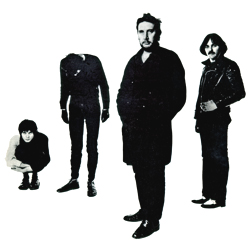
Black and White is the third studio album by English new wave band the Stranglers. It was released on 12 May 1978, through record label United Artists in most of the world and A&M in America.
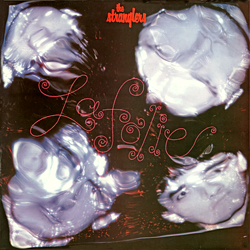
La folie is the sixth studio album by English new wave band the Stranglers. It was released on 9 November 1981, through the EMI record label Liberty.
The Radiators from Space, also known as The Radiators, The Rads, Radiators (from Space), and The Radiators Plan 9, were an Irish punk rock band. They have been described as Ireland's first punk band. Initially active 1976-1981, the band had a brief reunion in 1987-1988, and reformed in 2003 until the death of founding member Philip Chevron in 2013, with remaining members continuing as Trouble Pilgrims.

Waiting for Herb is the sixth studio album by the Pogues, released in 1993, and their first without lead singer Shane MacGowan.

All Hallow's E.P. is an extended play by American punk rock band AFI. It was released on October 5, 1999, through Nitro Records. It contains three original songs and a cover of the Misfits song "Halloween".
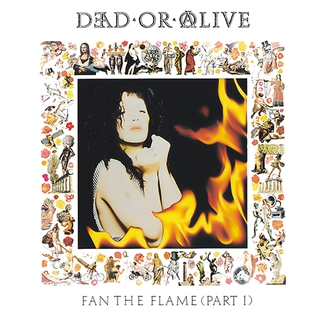
Fan the Flame is the fifth studio album from English band Dead or Alive, released in 1990. Epic Records released Fan the Flame in Japan only. The album remained an exclusive in this territory until the worldwide release of the Sophisticated Boom Box MMXVI compilation box set in 2016. The album marked a change in the band's musical style towards more melancholic lyrics and refined vocals from Burns. The background vocals on "Total Stranger" were performed by British pop group Londonbeat and the London Community Gospel Choir provided backing vocals for "Unhappy Birthday".
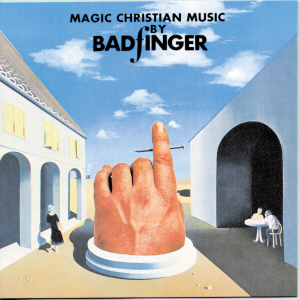
Magic Christian Music is the second studio album by the British rock band Badfinger, released on 9 January 1970 on Apple Records. It was their first release under the Badfinger name, having previously released the album Maybe Tomorrow in 1969 under the name The Iveys. It includes the band's first international hit, "Come and Get It", written and produced for them by Paul McCartney.

My People Were Fair and Had Sky in Their Hair... But Now They're Content to Wear Stars on Their Brows is the debut album by psychedelic folk band Tyrannosaurus Rex. The release of the album was planned for early May but delayed until 5 July 1968 by record label Regal Zonophone.
"Gardening at Night" is a song by American rock band R.E.M. It was recorded for the band's 1982 debut EP Chronic Town.

Agnes Bernelle was a Berlin-born actress and singer, who lived in England for many years, then Ireland. She appeared in over 20 films and also made stage and television appearances.

Light of Love is a US-only album released by British rock band T. Rex in 1974. It is composed of 3 tracks previously released in the UK on the album Zinc Alloy and the Hidden Riders of Tomorrow, together with 8 songs recorded in the Spring of 1974 at Music Recorders Inc. Studios in Hollywood which would later appear on the album Bolan's Zip Gun. The album was engineered by Gary Ulmer and, in the absence of Tony Visconti, was produced by Marc Bolan himself. The album marked the first time that a T. Rex album had been produced without Tony Visconti and also marked Bolan's debut in this role. "Till Dawn", was re-recorded for Bolan's Zip Gun with Bolan at the controls.
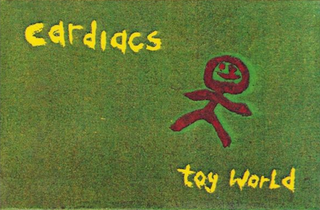
Toy World is the second demo album by the English rock band Cardiacs. The cassette is a mixture of older songs by the earlier Cardiac Arrest lineup and newer songs by the then-current Cardiacs lineup. This was the last album to feature keyboard player/backing singer Colvin Mayers, and the first to feature saxophonist/backing singer/occasional keyboard player Sarah Cutts.

The Time Has Come is an Irish folk music album by Christy Moore. The album also features instrumental work by Irish musician Dónal Lunny.


















